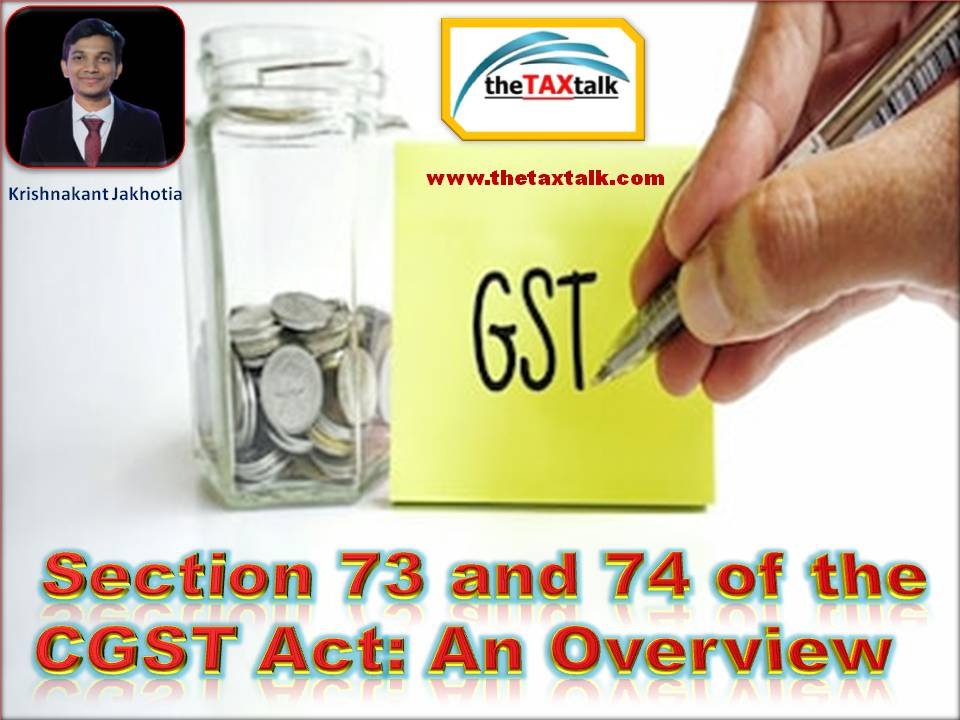![]()
Section 73 and 74 of the CGST Act: An Overview
The Goods and Services Tax (GST) Act has revolutionized the Indian tax system by unifying various indirect taxes under one umbrella. The Central Goods and Services Tax (CGST) Act plays a crucial role in ensuring the smooth implementation and administration of GST. Sections 73 and 74 of the CGST Act deal with the demand for tax from taxpayers. Understanding these sections is essential for both taxpayers and tax authorities to ensure compliance and avoid any legal complications. In this article, we will delve into the intricacies of Sections 73 and 74 and their significance in the GST regime.
Section 73 of the CGST Act
Section 73 of the CGST Act focuses on the determination of tax that has not been paid or has been short-paid by a taxpayer. This section provides the framework for tax officers to initiate an inquiry when they believe that a registered person has not paid or has short-paid the tax. To begin the process, the tax officer issues a notice in FORM GST DRC-01, which outlines the reasons for the demand and specifies the amount of tax, interest, and penalty due.
Section 74 of the CGST Act
Section 74 of the CGST Act pertains to the determination of tax not paid or short paid by a taxpayer due to fraud. Unlike Section 73, which deals with general non-payment or short payment, Section 74 is specifically aimed at cases involving fraudulent activities. Under this section, the tax office has the authority to issue a notice in FORM GST DRC-01 if there is a reason to believe that a registered person has intentionally evaded tax through fraudulent means.
Basic Points of Section 73 & Section 74 of CGST Act, 2017
| Particulars | Section 73 | Section 74 |
|
Limitation for issue of SCN |
3 months prior to time limit of order | 6 months prior to time limit of order |
| Limitation for issue of Order | Within 3 years from date of submission of annual return | Within 5 years from date of submission of annual return |
| Penalty before issue of SCN |
Nil |
15% |
| Penalty within 30 days after issue of SCN |
Nil |
25% |
| Penalty if the payment is made within 30 days of the communication of order. |
10% of tax or Rs. 10000 (whichever is higher) |
50% |
| Penalty if the payment is made after 30 days of the communication of order. |
10% of tax or Rs. 10000 (whichever is higher) |
100% |
The demand for Tax under Sections 73 and 74:
1. Serving the Notice :The tax officer initiates the process by serving a notice to the taxpayer under Section 73 or Section 74 of the respective tax act. These sections deal with cases where the tax officer suspects tax evasion due to fraud.
2. Receipt of Notice :The taxpayer receives the notice, which outlines the allegations and provides a specified timeframe within which a reply must be submitted.
3. Reply Submission :The taxpayer prepares a comprehensive reply to the notice, addressing each allegation and providing explanations along with supporting evidence to counter the accusations of tax evasion through fraud. The reply should be submitted within the specified timeframe.
4. Investigation :The tax officer examines the reply submitted by the taxpayer and conducts further investigations to verify the facts and claims presented. This may involve scrutinizing financial records, conducting interviews, or gathering additional evidence.
5. Assessment Order :Based on the findings of the investigation, the tax officer proceeds to issue a revised assessment order. This order determines the amount of tax, interest, and penalty payable by the taxpayer.
6. Tax Liability Demand :The assessment order serves as a demand for the tax liability arising from the fraudulent activities alleged in the notice. It specifies the amount of tax, interest, and penalty to be paid by the taxpayer.
7. Payment Compliance :The taxpayer is required to comply with the assessment order and make the payment of the tax, interest, and penalty within the stipulated timeframe mentioned in the order.
From,
Krishnakant Jakhotia
Mobile No :-9422507911
Email Id :- taxtalknew@gmail.com


